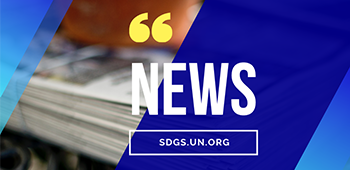Multi-stakeholder partnerships
Description
The achievement of the 2030 Agenda for Sustainable Development and the Sustainable Development Goals require all hands on deck. It require different sectors and actors working together in an integrated manner by pooling financial resources, knowledge and expertise. In our new development era with 17 intertwined Sustainable Development Goals and 169 associated targets as a blue-print for achieving the sustainable Future We Want, cross sectorial and innovative multi-stakeholder partnerships will play a crucial role for getting us to where we need by the year 2030.
Partnerships for sustainable development are multi-stakeholder initiatives voluntarily undertaken by Governments, intergovernmental organizations, major groups and others stakeholders, which efforts are contributing to the implementation of inter-governmentally agreed development goals and commitments, as included in Agenda 21, the Johannesburg Plan of Implementation, the Millennium Declaration, the outcome document of the United Nations Conference on Sustainable Development (Rio+20) entitled “The Future We Want”, the Third International Conference on Small island Developing States, and the 2030 Agenda for Sustainable Development.
Sustainable Development Goal 17, which reads “Strengthen the means of implementation and revitalize the Global Partnership for Sustainable Development”, recognizes multi-stakeholder partnerships as important vehicles for mobilizing and sharing knowledge, expertise, technologies and financial resources to support the achievement of the sustainable development goals in all countries, particularly developing countries. Goal 17 further seek to encourage and promote effective public, public-private and civil society partnerships, building on the experience and resourcing strategies of partnerships.
Our work
The Division for SDGs supports, facilitates and monitors multi-stakeholder partnerships and voluntary commitments forged in support of sustainable development and the SDGs. announced at various international sustainable development conferences.
The Division also maintains the Partnerships for SDGs online platform – a global registry of commitments and multi-stakeholder partnerships made through various UN conferences in support of the Sustainable Development Goals (SDGs). These include the SDG Summit (2019), the UN Ocean Conferences (2017 and 2021), the Small Island Developing States (SIDS) Conference (2014), and the Rio+20 Conference (2012), among others.
Following the 2014 Third International Conference, the Small Island Developing States (SIDS) Partnership Framework was established by the General Assembly with the purpose of monitoring progress of existing, and stimulating the launch of new, genuine and durable partnerships for the sustainable development of SIDS. The Division, in collaboration with OHRLLS, is the supporting Secretariat to the framework.
In collaboration with several partners, In 2019 the Division launched, in collaboration with partners, the 2030 Agenda Partnership Accelerator to help accelerate and scale up effective partnerships to advance the SDGs. The initiative provides research on effective partnership practices and capacity development of relevant stakeholders to develop and implement partnerships to advance the SDGs. A particular focus of the Partnership Accelerator is to support developing countries in forging new partnerships to advance the SDGs by strengthening collaboration between stakeholders and sectors at the national level.

2030 Agenda Partnership Accelerator
Accelerating effective partnerships in support of the Sustainable Development Goals
Read more
SIDS Partnerships Awards
Recognising and rewarding the efforts of the best and most noteworthy, genuine and durable partnerships in the implementation of the sustainable development priorities of SIDS
Read more
SDG Partnership Guidebook
A practical guide to building high-impact multi-stakeholder partnerships for the SDGs
Read morePagination
Pagination
Milestones
-
September 2019 SAMOA PATHWAY High-Level Midterm Review 2019The UN General Assembly (UNGA) at the 69th session in 2016 decided to convene at UNHQ in September 2019 a one-day high level review of the progress made in addressing the priorities of small island developing States (SIDS) through the implementation of the SIDS Accelerated Modalities of Action (SAMOA) Pathway. The UNGA also decided that the high level review will result in “a concise action oriented and inter-governmentally agreed political declaration”.
-
January 2015 SDG 17SDG 17 focuses on strengthening the means of implementation and revitalizing the global partnership for sustainable development. Sustainable Development Goal Target 17.16 aims to "Enhance the global partnership for sustainable development, complemented by multi-stakeholder partnerships that mobilize and share knowledge, expertise, technology and financial resources, to support the achievement of the sustainable development goals in all countries, in particular developing countries". Sustainable Development Goal Target 17.17 is committed to "Encourage and promote effective public, public-private and civil society partnerships, building on the experience and resourcing strategies of partnerships".
-
January 2015 Establishment of SIDS Partnership FrameworkOn 4 December 2015 the 2nd Committee adopted the draft resolution (A/C.2/70/L.47) which decided to establish the Small Island Developing States Partnership (SIDS) Framework, in accordance with paragraph 101 of the SAMOA Pathway. The SIDS Partnership Framework, which is to monitor and ensure the full implementation SIDS partnerships, is based on a set of recommendations which were prepared by DSD in close consultation with member States. The SIDS Partnership Framework consists of: · Steering Committee - open to all States Members of the United Nations or members of the specialized agencies, chaired by one small island developing State and one State that is not a small island developing State, to be appointed by the President of the General Assembly. · Organization on an annual basis a Global Multi-stakeholder SIDS Partnership Dialogue · DESA to finalize a standardized partnership reporting template and process of SIDS partnerships The SIDS Partnership Framework also encourages national and regional partnership dialogues to be organized through existing forums and meetings.
-
January 2014 Samoa PathwayThe Third International Conference on Small Island Developing States was held from 1 to 4 September 2014 in Apia, Samoa. The overarching theme of the conference was "The sustainable development of small island developing States through genuine and durable partnerships". The SIDS Accelerated Modalities of Action (SAMOA) Pathway (Samoa Pathway) adopted at the Conference addresses priority areas for SIDS and calls for urgent actions and support for SIDS’ efforts to achieve their sustainable development.
-
January 2012 Future We Want (Para 283, Registry of Commitments)In the Registry of commitments, Future We Want welcomes "the commitments voluntarily entered into at the United Nations Conference on Sustainable Development and throughout 2012 by all stakeholders and their networks to implement concrete policies, plans, programmes, projects and actions to promote sustainable development and poverty eradication". Member States also call the Secretary-General to "compile these commitments and facilitate access to other registries that have compiled commitments, in an Internet-based registry. The registry should make information about the commitments fully transparent and accessible to the public, and it should be periodically updated".
-
January 2003 CSD11/WSSDAt its 11th Session in May 2003, the Commission on Sustainable Development (CSD) reaffirmed that these partnerships contribute to the implementation of intergovernmental commitments, recognizing that partnerships are a complement to, not a substitute for, intergovernmental commitments.
The 2030 Agenda Partnership Accelerator is a collaborative initiative by United Nations Department of Economic and Social Affairs (UN DESA) and The Partnering Initiative, in collaboration with United Nations Office for Partnerships (UNOP), UN Global Compact, and the UN Development Coordination Office. The initiative aims to significantly help accelerate effective partnerships in support of the Sustainable Development Goals.
Direct partnership training support and advisory services are offered to member States and UN entities/Resident Coordinators/country teams wishing to foster stronger collaboration between stakeholders and sectors, and enhance their capacities in forging new multi-stakeholder partnerships and partnership platforms.
Read more at: https://partnershipaccelerator.netlify.app/




